 Vampire Weekend's Surprising Jewish Stories
Vampire Weekend's Surprising Jewish Stories
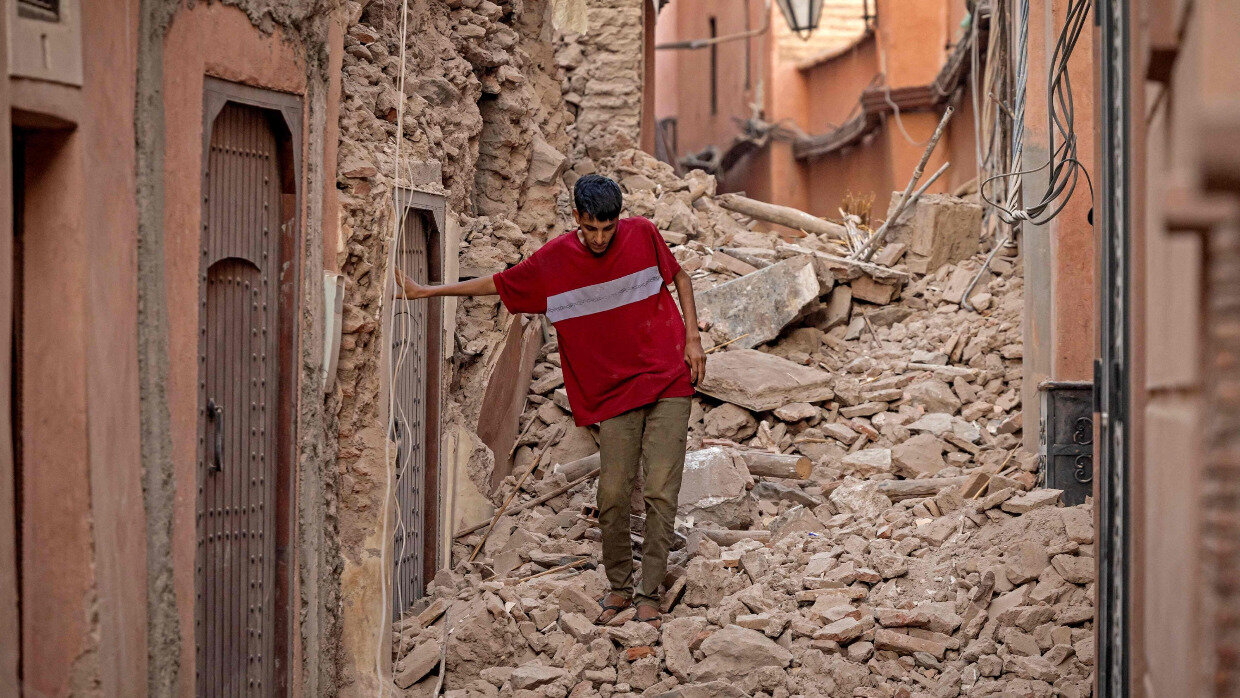

7 min read
Morocco’s ancient Jewish quarter was severely damaged by Friday’s earthquake.
The horrific 6.8 magnitude earthquake that struck Morocco on Friday night killed thousands of people; many more are injured or missing. International rescuers have been pouring into Morocco to help. Israel’s highly trained disaster relief experts are on stand-by, waiting for permission from Morocco to enter the country and help.
The epicenter of the earthquake was in the High Atlas mountain region, about 45 miles southwest of Marrakesh (also known as Marrakech), Morocco’s fourth-largest city. Much of Marrakesh has been damaged, including the city’s historic “Mellah,” or Jewish quarter. “It’s as if it was hit by a bomb,” explained Hafida Sahaouia, a resident of the quarter, whose own home was utterly destroyed. “We were preparing dinner when we heard something like explosions. Panicked, I quickly went outside with our children. Unfortunately, our house collapsed. We lost everything.”
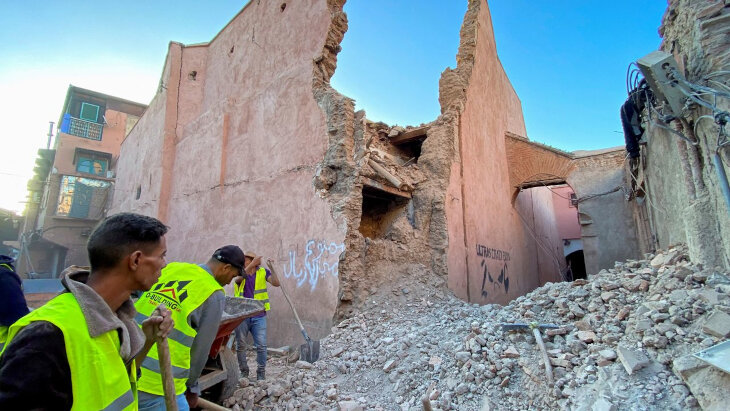
Much of the Mellah is currently impassable. Once home to one of the largest Jewish communities in the Arab world, today it seems that this centuries-old Jewish quarter has been reduced to rubble.
While rescuers race against the clock to save survivors, Morocco’s Jewish community is coming to terms with incredible loss of life, as well, and the destruction of what was one of the world’s most-visited and unique Jewish quarters. Here is a brief Jewish history of the Mellah.
Moroccan Jews have long traced their history back to refugees who fled west after Babylonian King Nebuchadnezzer destroyed the first Jewish Temple in Jerusalem in 586 BCE. Legends also abound about Jews visiting Morocco from the Land of Israel in Biblical times to purchase gold to bring back to Israel, or to fight the Philistines who’d been driven out of the Land of Israel. The oldest archaeological evidence of Jews in Morocco is ancient Hebrew-language tombstones in the ruins of the Roman town of Volubilis in Morocco.
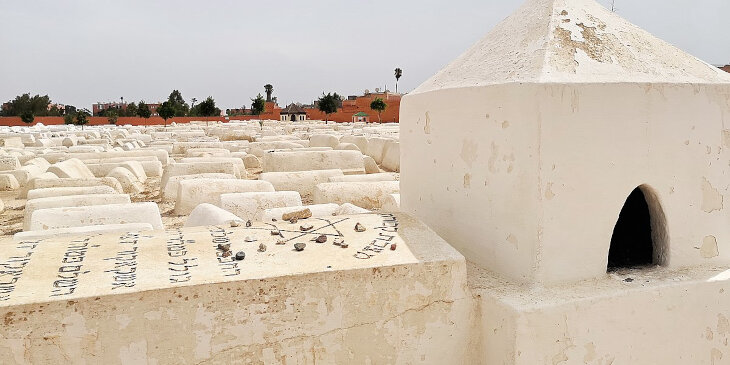 The Miara Jewish Cemetery.
The Miara Jewish Cemetery.
One Medieval Islamic scholar, Ibn Khaldun (1332-1406) wrote that Jews became so numerous and influential in the area that Berber tribes converted en masse to Judaism. For generations, Khaldun’s assertion was taken as fact, and it was widely assumed that many Moroccan Jews had origins in local tribes. In recent years historians have largely debunked this claim, noting that Morocco’s Jews almost certainly descend directly from visitors from the Land of Israel.
Morocco’s territory was largely conquered in the Seventh century CE by the fearsome Muslim warlord Abu al-Muhajir Dinar al-Ansari. He and his troops pressured local Berber leaders to convert to Islam, along with their tribes. Within a generation, the area of present-day Morocco became nearly entirely Muslim. The land’s substantial Christian community largely disappeared. Morocco’s Jews, however, resisted calls to convert, maintaining their distinct beliefs and lifestyles.
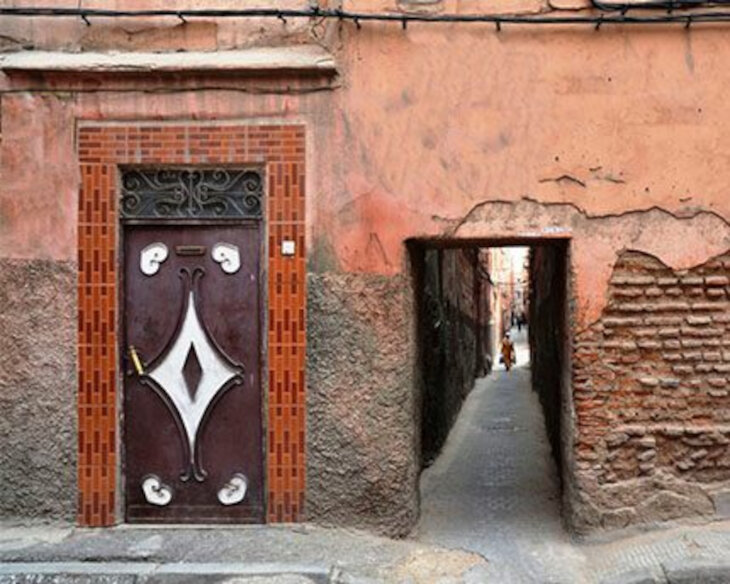
Muslim leaders largely tolerated Jews, imposing a “dhimmi” status on them. So long as Jews paid special dhimmi taxes and avoided prestigious professions, they were allowed to remain in Moroccan lands. The conditions Moroccan Jews faced varied. At times, they were allowed to live in Moroccan cities; at other times they were forced to relocate. Under the leadership of Yusuf Ibn Tashfin (c1061-1106) any Jew found to have stayed in Marrakesh overnight was put to death.
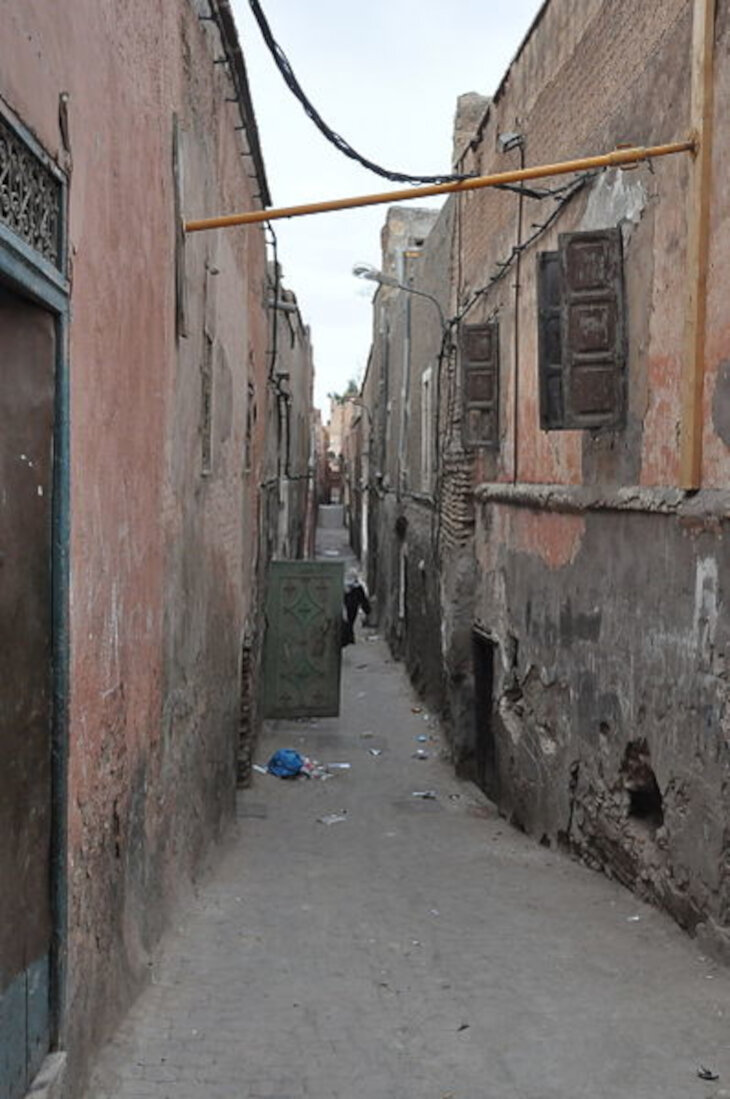
For Moroccan Jews, periods of relatively peaceful coexistence alternated with horrific anti-Jewish violence as anti-Jewish pogroms broke out during times of political and social tension. One pogrom in Fez in 1033 is thought to have killed over 6,000 Jews. A major pogrom broke out in Marrakesh in 1232. Some historians believe that another pogrom in Fez in 1465 killed nearly all of the city’s Jews.
In the 1400s, the Sultan took steps to protect Fez’s Jews, inviting them to live in a royal property called the Mellah. “Mellah” means salt in Arabic, and the land he allowed Jews to settle on is thought to have once been either a storehouse for salt or a place where saltwater was stored. Soon, other Moroccan cities established “Mellahs” of their own, including Marrakesh.
Spanish Jews had long fled to North Africa during times of persecution in Spain. After the expulsion of all Jews from Spain in 1492, what had become a steady trickle of Jewish immigration into Morocco became a flood. Spanish (and later Portuguese) Jews poured into Moroccan Jewish communities; Marrakesh was a popular destination for these newcomers.
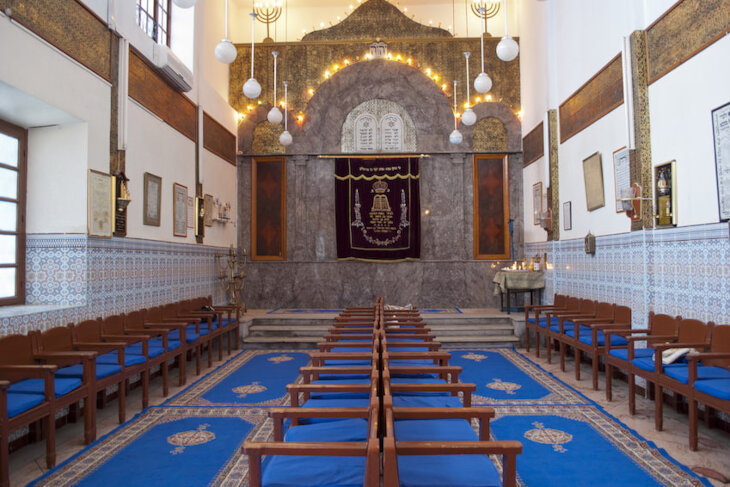 The Slat al-Azama Synagogue
The Slat al-Azama Synagogue
It took generations for the two groups to mix. Jews who’d long lived in Morocco referred to themselves as Toshavim: “residents.” Many spoke local dialects incorporating Hebrew and Moroccan Berber words. Spanish and Portuguese newcomers were known as Megorshim: “those who were expelled.” They spoke different Arabic dialects as well as the distinctive Jewish language Ladino. The two Jewish communities lived side by side, but worshipped in their own synagogues which maintained different traditions. One of Marrakesh’s best-known and most beautiful synagogues, the Slat al-Azama Synagogue, was founded by Spanish Jews.
Until the 1920s, Marrakesh’s Mellah was home to the largest Jewish community in all of Morocco, maintaining dozens of synagogues and schools. Marrakesh became an important local center for studying the Talmud and Kabbalah, or Jewish mysticism. While Jews in other Moroccan Mellahs suffered from waves of violence and intense poverty and prejudice, Marrakesh’s Jewish community fared better than most. Some local rulers unleashed violence on Marrakesh’s Jews. For generations, however, Jewish life and learning flourished. By the 1947 census, Marrakesh’s Mellah was home to over 50,000 Jews.
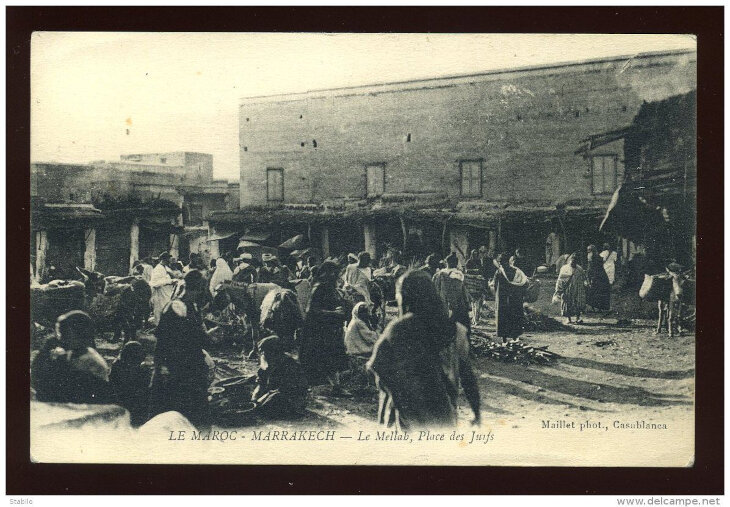
During World War II, the Vichy French regime ordered Morocco’s Sultan Mohammed V to implement the same anti-Jewish decrees as Vichy France. The king famously refused, declaring “There are no Jews in Morocco. There are only Moroccan subjects.” Sadly, the Sultan’s tolerance did not extend to all his subjects; when Allied troops landed in North Africa in 1942, anti-Jewish pogroms spontaneously broke out throughout the country. Foreign Jews who fled to Morocco seeking safety were imprisoned in concentration camps.
With the establishment of the state of Israel in 1948, violence flared once again against Moroccan Jews, particularly in the cities Djerada and Oujda. Dozens were murdered and many more were injured. In later years, anti-Jewish violence spread to other Moroccan cities. Though the Jews of Marrakesh were largely safe from the massacres and pogroms in other Moroccan towns, they joined an exodus of Moroccan Jews leaving for Israel. Thousands of Jews left each year, until 1956, when Morocco gained independence and forbade Jews to leave. Instead of being reassured that their newly independent country would protect them, Morocco’s Jews increased their pace of emigration, leaving illegally to make their way to Israel.

Between 1948 and 1971, over a quarter of a million Jews moved from Morocco to the Jewish state.
Despite the huge numbers of Jews who left, Marrakesh and a few other Moroccan cities remained home to small Jewish communities. In 2020, it was estimated that about 2,000 Jews continue to call Morocco home; 250 of these lived in Marrakesh.
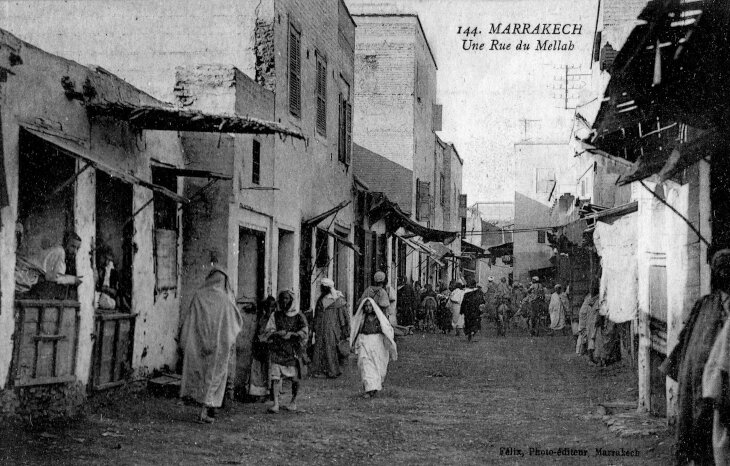
Marrakesh’s Mellah became a tourist destination in recent years, with visitors from all over the word drawn to its evocative streets and plazas and breathtakingly beautiful synagogues. In 2017, King Mohammed VI met with Marrakesh Jews and heard their complaints that local city authorities had removed many of the historic Jewish names from streets and landmarks in the neighborhood, replacing them with Arabic names. The king ordered that the old Jewish street names be restored.
With the terrible destruction by the earthquake, the future of this once-vibrant Jewish community is in question. Please pray for the safety of all the victims of Friday’s earthquake.

I have just come back from Marrakesh. The Melah seems to have recovered remarkably well, Moroccan people seem to be resilient and bounce back from adversity very well.
During 2005 I visited Malaga in Spain and purchased kosher meat from a kosher meat wholesaler who was mirrocan and sourced his produce from Moroco.
He tried to persuade us to take our morohone there. We were too frightened.
I wish I had read this article then
I was in the Jewish quarter in Marakesh 2 days before the earthquake. We were a group of 7 women. We visited the Mallah. From there we traveled to Casablanca and came home Thursday night. I consider myself and others to be lucky to leave the city just in time. I pray for the Moroccan people and their Jewish communities to be safe.
This was so interesting
I had the pleasure of visiting many Jewish cities in Morocco a few months ago 2023. I was amazed at the amount of Jewish history, although the Mellahs were not much to see. Hopefully with the Abraham Accords, Israel will take a hand in helping to rebuild Morocco and especially the Jewish sites of historical significance.
How come no mention on any Jewish sites of the human lives that were lost, people's home totally washed away, economic loss in Greece which also affected /effected the Jewish communities in Larissa, Trikala, Athens & other communities. They didn't call out for help & none was offered by Israel. The US is asleep as well. SAD!! Major flooding where streets literally turned into rivers. Greece got hit 100 years ago with the same type storm.
So saddened to read of the horrific destruction of the Jewish quarter of Marrakech on Friday night.
I wish all those affected by the loss of their entire homes and belongings
much comfort, all those who were injured a very Speedy Recovery to good
health again and all those who have lost loved ones I wish a ‘Long Life’ free from further sorrows.
I was fortunate to be born and raised in Morocco.
Fes had more than seventy synagogues.
The Rambam was sent by his father to Fes in 1159 ( where he stayed until 1165 ) for one reason: To study Torah with the Gaon El Rif’
disciples. Jewish tourists can visit the Rambam’s house . The Rambam was also teaching the Muslims in Arabic.Fes , then was the world’s
Mirkaz Hatorah ( the Torah World’s Center )
Read “ Deux mille ans de vie juive au Maroc “
( Two thousand years of Jewish Life in Morocco)
by Chayim Zafrani
The current monarch King Mohamed VI like his father and grandfather is very close to the Jewish community . He restored Jewish historic sites
( synagogues, cemeteries Jewish Mellahs) and created Jewish museums ( Essaouira, Fes, Casablanca…
I would suggest to the author first and foremost to read the extremely informative history books about the Moroccan Jews ‘s History written by
Chayim Zafrani Z”L ( Jewish History Chairman University of Paris )
There were much more Jewish friendly Moroccan dynasties than pogrom oriented ones ( Almohade) .Nobody would deny there were some pogroms in Morocco ( my grand mother Z”L would tell me about “ The killing of Jews” in Fes ( our home town) that took place at the beginning
Of the twentieth century ) before the king protected them
This Alaouite dynasty has been very friendly and close to the Jews ( the late kings Mohamed V and. His son Hassan II would come to the big synagogue in Casablanca sit attend the Yom Kippur service for one hour and be blessed by the rabbi before they left
This article provided me much knowledge concerning our Jewish people living or gone now in the Jewish Quarter of Morocco. Sadly, it's history is the same when ever our people yearn to be free and follow and practice our faith-Pogroms, discrimination, placed to live in special sections, kept out of many professional working industries. However, no Earthquake can destroy our "Faith and the SOUL of the Jewish People! Elisha/Benjilini *My roots are Tunisian(Father's side)American Ukranian(Mother's side)and I was born in Israel.
I visited the Jewish quarters in both Fez and Marrakesh with a group of UK Jews. Wonderful experience. Eveything must be done not to lose this connection.